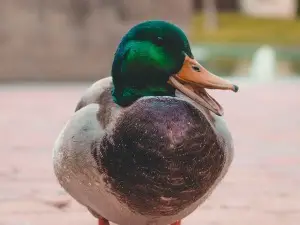
Breathing is so normal that we don’t even realize that we’re going it. So, a change in your breathing is a sign that there is something amiss in your body, the same goes for ducks.
You’ll know that there is something wrong with your duck if it starts breathing fast, this article explores why this happens and what to do about it.
Table of Contents
Duck breathing fast:
If you want to ensure that your duck lives a long and healthy life you need to keep an eye on the bird to make sure that the bird doesn’t get sick or injured. Even minor sicknesses can cause death in your duck.
Breathing fast can be a sign that your bird is suffering from heat exhaustion.
Heat exhaustion in ducks:
Ducks, just as with humans, can become overheated, this is especially true if the birds are in an area with high heat and high humidity. The combination of the two may simply be too much for the birds.
These birds are used to being in cool environments, their body fat and feathers keep them warm in these cool environments.
If this is your bird’s first summer then the bird may not be quite adjusted to the hot summers where you are.
Birds who have darker colors may struggle more because dark colors absorb wavelengths of light and convert them into heat while light colors reflect wavelengths of light away from them
Because ducks do not sweat, they don’t have sweat glands to sweet out of, so, one of the ways that ducks release heat from their bodies and cool down is by panting, or, breathing fast.
Your birds can become overheated even if the birds are in shaded areas and are given access to water. This simply means that the bird doesn’t have access to enough cold water and needs more of an intervention when it comes to keeping cool.
Other signs of heat exhaustion:
Other signs of heat exhaustion in ducks include ruffled feathers, wings held out to their sides as a way to cool them off, weakness, as well as laying down
If the bird isn’t showing any other signs of being in distress or ill health then the bird is likely fine and just needs some time to cool off.
Just be sure to keep an eye on this bird to make sure it goes back to normal after cooling the duck off
How to help the duck:
Overheating in ducks can be very serious, thus overheating needs to be rectified as soon as possible. There are many ways to help the bird cool down including:
Ice packs:
You can leave ice packs on, next to, or against the bird’s body to help the bird cool down.
If you don’t have any ice packs you can alternatively fill water bottles with water, freeze them and lay these, next to or against the bird’s body to help it cool down.
You can leave an ice pack on the bird for up to 10 minutes at a time.
Move them into the shade:
Ducks may need the sun in order to create their own vitamin D but these birds also need some time in the shade so they can cool off.
Move your birds to a cool and shaded area to get them feeling back to normal. You may even want to set up a fan near them to keep them cool and keep the areas cool.
Offer an ice bath:
The birds may or may not currently have access to water bodies that they can swim in, if you want them to cool off them offer them an easy-to-access kiddie pool or another water body that they can splash around in.
You can keep the water in the pool from quickly getting too hot by placing some ice cubes in the water, or by leaving a few frozen bottles of water in the pool.
Fresh water is critical to these birds. The birds will dip their head in the pool to clear their nostrils and swim in the water getting the pool water dirty.
You can keep the water clean by refilling these pools with fresh water several times a day. Also, keep these pools in the shade.
Feed them cool treats:
Your birds need to eat regardless of how overheated they are. You can feed them while cooling them down by offering the birds cooled treats.
Refrigerate some sliced-up watermelon, peas, sliced-up strawberries, lettuce, and sliced-up cucumbers, and feed these to your birds to cool them off
You can leave these treats in a little pool of cold water that’s too small for them to get into.
If you enjoyed this article then you may also be interested in other chicken related articles. Here are some articles that you may be interested in: Why Do Ducks Change Colour?, Duck Sneezing Treatment, Duck Breathing Loud, Duck Bill Colour Change, Duck Breathing Heavy

